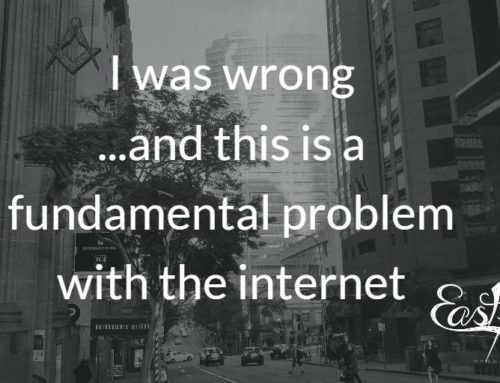Definition: Characterised by weakness of will resulting in action against one’s better judgement.
Should you watch just one more episode of Game of Thrones before bed, or have that extra piece of pie?
Probably not.
Drug addicts, gamblers, hedge fund managers. You and me. We’re all akratic, to varying degrees.
We’re all swimming through a soup of cognitive biases every waking minute of our lives. It’s very hard to even conceptualise how you might make a purely rational decision, because, for example:
- our illusion of explanatory depth tricks us into thinking we understand something more than we do
- the availability effect tricks us into thinking probabilities of certain things are higher than they are
- we use hyperbolic discounting to choose a short-term reward at the expense of a greater long-term one
- once we’ve made a decision, the confirmation bias makes us reject conflicting evidence and only agree with information that supports our original decision.
And before you know it, you’ve spent nearly twice as much on a car as you intended and taken out a loan over a longer term with total costs significantly higher than the purchase cost. And you’ve convinced yourself that it was a good idea.
A colloquial term I’m fond of for this process is ‘man maths’. You find a thing you want to buy, but it’s expensive. You research it, and over time find ways to offset the cost in your mind.
The current car is going to need major servicing soon, and tyres… That’s like $2,500 right there, which is basically $3,000. With the new one we can go on more picnics and save money eating out! That’s got to be a couple of thousand a year… And because it’s a couple of years old, we’re saving money on buying it new because it’s already depreciated! And because it’s a better car, we can keep it longer! Oh, and of course, the resale of this one will be higher than the cheaper one… We really can’t afford not to buy it. I think we’re losing money the longer we wait.
The thing is, being aware of biases, doesn’t make you immune to them. To quote Richard Muller, the difference between a layman and a scientist is:
…a layman is easily fooled and is particularly susceptible to self-deception. In contrast, a scientist is easily fooled and is particularly susceptible to self-deception, and knows it.
Salespeople and marketers understand this. If you’d like to learn more about the tricks they use, check out our new course on persuasive writing.
We also have web writing and plain English courses booked in for May and June, all over Queensland and in Sydney and Melbourne. Book before April 20 to get 15% off! (Use the code ‘Bias Soup’ at the checkout.)
(See course dates and locations.)







